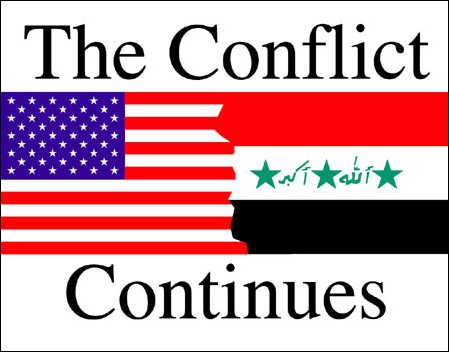Students have mixed feelings about war

Image: Students have mixed feelings about war:Graphic By Cody FrostState Hornet:
December 4, 2002
Increased taxes, a raise in gas prices and the possibility of a draft and attack are just a few of the problems facing college students in the event of a conflict with Iraq.
Sacramento State government professor Peter Davies said there will be little initial impact financially to students, but there could be greater cost if a prolonged war took place.
“I suspect very few for most students other than perhaps a relatively short spike in the price of gas,” Davies said. If it were to escalate into a wider Middle East war that caused permanent damage to oil fields and facilities it could cause long term damage to the economy. The most likely financial problem for at least some students would be for those in the military reserve or National Guard units who might be called up to active duty and thus temporarily lose their civilian income as well as having to put their education on hold.”
The American Automobile Association of Northern California released a report stating gas prices have risen by eight cents, from $1.73 per gallon to $1.81 in the last month in the San Francisco area in anticipation of a war with Iraq.
In addition to the increase in gas prices, students may also have to face the possibility of an enactment of the War Powers Act that allows the government to draft citizens in the event of a prolonged war.
Sac State student Amir Mizany, a senior majoring in Management Information Systems, said he would dodge a government draft by telling officials the worst possible excuse.
Santiago Avilar, a senior majoring in History said he would fight in the war if drafted, despite the fact that he is married and has a young daughter.
“I would go, but I wouldn’t volunteer,” Avilar saidDavies said there is no need to be concerned as he thinks there will not be the need for a draft.
“I don’t foresee any military need for such large numbers of troops, nor do I see the conflict dragging on at such a high intensity long enough for conscripts to be trained and still be needed,” Davies said. In addition the political cost and political resistance to the current administration of reintroducing conscription would be astronomical.”
Although there have been no direct attacks to the U.S. recently, Avilar thinks an attack on California could happen soon.
“I think the west coast is in danger of being attacked. They’re putting a lot of heightened security on the east coast and they are neglecting the west,” Avilar said.
Avilar said he thinks the terrorists realize this and could easily smuggle a small nuclear weapon into San Francisco that would be powerful enough to reach the Sacramento area.
He said the real danger would come from chemical weapons that could be used against the U.S.
California has programs in place to aid the public in the event of a chemical weapon attack including counseling and educating on what to do in case of attack.
The Center for Economic and Policy Research reports taxes would be raised approximately 1.7 percent in order to pay for a war against terrorism if a report by the Congressional Budget Office is accurate. In the report released by the CBO, a conflict with Iraq would cost the United States roughly $13 billion to deploy troops, $6-9 billion per month of fighting a war, $5-7 billion to return troops and $1-4 billion to occupy Iraq.
“I think it’ll get ugly.” Avilar said. “It could be more than just Iraq, all of our enemies in the Middle East could attack us.”























































































































